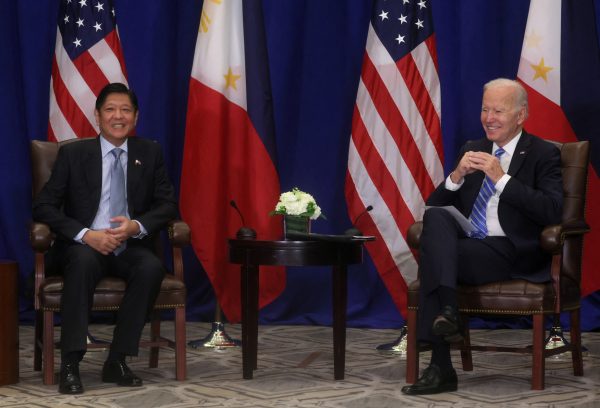After Duterte’s election in 2016, Manila’s approach towards its most important international relationships was pulled in different directions by personalities, politics, and the tensions between the interests at stake in its relationships with China and the United States. A big variable was the president himself, whose madcap governing style extended to how he handled the management of these two critical partnerships.
The Philippines wasn’t by any means unique in this regard. What appear to be Southeast Asian states’ finely calculated strategies of hedging and balancing amid great-power competition are, when scrutinised closely on the ground, often a process of trial and error in which policy fights are shaped by domestic economic, and even personal, interests and short political time horizons.
The Philippines was distinctive in how transparently all this played out, and how important the whims of a personalist leader were in setting the tone for alliance management.
After the landslide election of Ferdinand ‘Bongbong’ Marcos Jr in this year’s presidential election, the Philippines is embarking on a reset of foreign policy under a less freewheeling — though no less politically dominant — president. This doesn’t mean that the Marcos approach to foreign affairs is predictable: he largely avoided talking seriously about policy during the election, appealing instead to nostalgia for the airbrushed version of his father’s dictatorship presented during his campaign. Onlookers were left to project their highest hopes and worst fears onto where he might end up.
These onlookers included policymakers in Washington, where Marcos’ election ‘has been met with cautious optimism…regarding the future of the US–Philippines alliance’, Luke Lischin writes in our lead article this week.
Marcos has talked the talk about bringing the Philippines back into alignment with the United States, signing up to the Biden Administration’s Indo-Pacific Economic Framework (IPEF) and paying rhetorical tribute to the US ‘special relationship’. Visiting New York for the United Nations General Assembly this week, he touted the Philippines’ potential as an investment destination for American capital and broke a seven-year drought of meetings with US presidents by sitting down with President Biden on the sidelines of the UN General Assembly.
But as Lischin cautions ‘the pro-US rhetoric espoused by the Marcos administration is not a reliable indicator of the President’s commitment to the alliance’. The economic and strategic realities that pulled the Philippines closer to China are still there. And just like its predecessors, ‘the Marcos administration appears willing to sidestep issues of national sovereignty’ — specifically on the question of the South China Sea — ‘in order to strengthen the Philippines’ economic relations with China’
He concludes that ‘[a]s long as the Marcos administration continues to hedge, it is unlikely that the United States will be able to convince the Philippines to advance geopolitically sensitive projects that are critical to the alliance’.
The importance that economics has had in drawing China and the Philippines closer — in spite of the dispute over overlapping claims in the South China Sea — only highlights how relatively empty-handed Washington is when it comes to using trade and development to bind Southeast Asian partners closer to it. Washington might counter that the Philippines and similar Asian developing countries are courting trouble by boosting economic ties with China, whose government has proven that it has no compunction about making trade, aid and investment part of its sticks-and-carrots diplomacy.
But Southeast Asian governments understand that perfectly well, and most have decided that it’s a trade-off they are willing to make. As Manila seeks to re-engage with China on a multibillion-dollar infrastructure financing and construction package, it continues to deprioritise pursuing its legal claims to parts of the South China Sea. Marcos himself says he doesn’t want the dispute to be ‘the defining element of our relationship [with China]’.
By expanding economic ties with the Philippines and other Southeast Asian countries Washington could help make the trade-offs involved in deepening economic ties to China less acute by giving the region options for investment, aid and export markets. But that means more substantial forms of economic engagement than IPEF heralds, and will have to wait for the political winds to change in the United States.
Still, it’s a more palatable option than waiting for the next most likely thing to get the Philippines to lean back into the US relationship: namely, a crisis provoked by Chinese envelope-pushing in the South China Sea, such as beginning land reclamation on Scarborough Shoal, the disputed but as-yet undeveloped islets lying within the Philippines’ Exclusive Economic Zone.
Ultimately, some of the key decisions impacting the Philippines’ relationship with its longstanding treaty ally won’t be made in Manila or Washington, but in Beijing as well.
The EAF Editorial Board is located in the Crawford School of Public Policy, College of Asia and the Pacific, The Australian National University.

